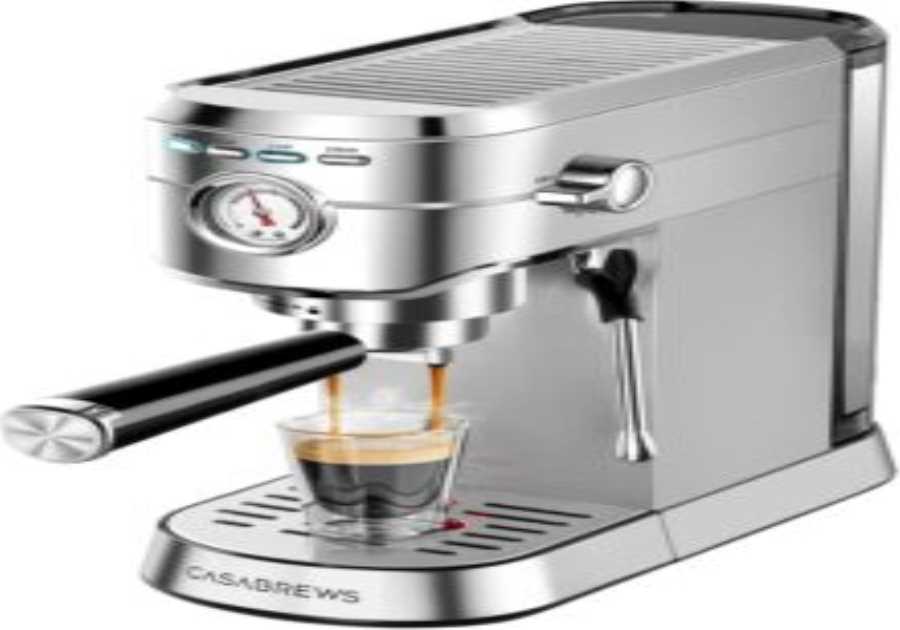Competitions are some of the most exciting and innovative events in the coffee industry. Every year, many of us eagerly wait to find out who is crowned the new world champion or which varieties are set to become more popular.
But among an increasingly diverse range of high-level coffee competitions, the World AeroPress Championship stands out as one of the most inclusive and accessible. From its humble beginnings in 2008 with just three competitors to some 120 regional and national events now taking place in over 60 countries, the WAC has changed exponentially over the past 15 years.
A big part of the evolution of coffee competitions is keeping them fresh and current. In October 2023, WAC organisers announced a new multi-round, points-based format for this year’s national Australian championship, which is sure to change the future of the event.
The 2023 World AeroPress Championship will take place on 1 December in Melbourne, Australia. In anticipation of this year’s world final – and how it might change in the coming years – I spoke to 2019 World AeroPress Champion, Wendelien van Bunnik-Verver, and Tim Williams, CEO of the WAC, to learn more.
You may also like our article on how coffee competitions are changing.
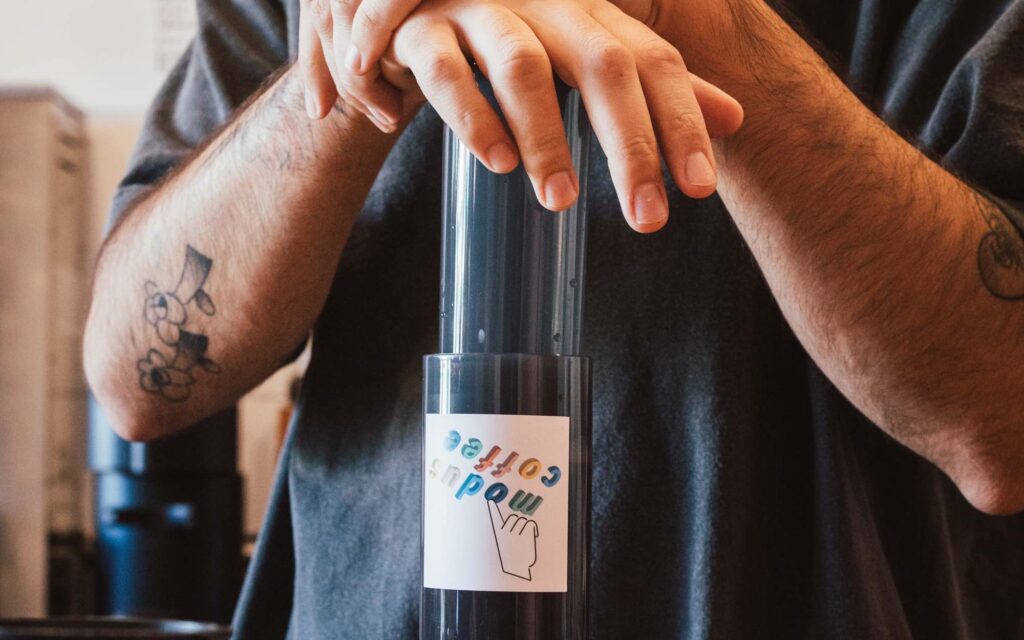
How did the World AeroPress Championship start?
The format of AeroPress Championships is relatively simple. Each round, three competitors have five minutes to prepare, extract, and serve three identical coffees using either an AeroPress Clear or original brewer. The panel of three judges then blindly cups all coffees, before pointing to their favourite on the count of three.
It’s exactly this more informal, less rule-focused approach that has made the World AeroPress Championship so popular. Regional and national competitions attract thousands of participants and visitors every year, but how did it all begin?
Let’s go back to 2008. The AeroPress had been available for three years, and the 2004 World Barista Champion Tim Wendleboe had just started to distribute the brewer in Norway.
As well as being the CEO of the WAC, Tim Williams is also the founder of Fieldwork Coffee – a micro roaster in Australia. He explains, rather wryly, that the AeroPress came with instructions but “if you followed them, the coffee kind of sucked”.
He adds that the initial idea for the competition was born from the fact that no one really knew how to use the brewer to make high-quality coffee. So industry legend Tim Wendelboe and Tim Varney (his coffee shop manager at the time) organised the first-ever national AeroPress Championship, with the premise that “whoever brews the best cup of coffee wins”.
This first competition was a small affair – with Tim Wendelboe, Tim Varney, and local coffee enthusiast Anders Valde taking part.
“There were three competitors and maybe ten people watching,” Tim Williams says.” It was just a bit of fun one afternoon.”
The WAC begins to grow
Following the first AeroPress Championship, a second competition was held in Norway in 2009. A year later, other Nordic countries had started to host their own versions of the event.
“They would happen at trade shows, with maybe 40 or 50 people watching,” Tim tells me. “They were very casual events that would just sort of happen, there wasn’t a lot of structure to them.
“It certainly wasn’t like countries were competing against each other,” he adds. “The focus was more on the individual.”
In the years since, the more informal format of the World AeroPress Championship has stayed true to its roots. But more importantly, it has helped to set several important precedents in specialty coffee competitions. For one, a coffee enthusiast (and not an industry professional) won the first-ever AeroPress Championship – even beating a World Barista Champion.
“Andres was a regular customer at Tim Wendelboe,” Tim Williams recalls. “He wasn’t a coffee pro.”
Additionally, the WAC was one of the first coffee competitions to see women crowned as the winners. Danish competitor Maria Hagemeister was announced as the 2010 World AeroPress Champion – the first-ever female winner only two years after the first event.
We’ve also seen other women win the World AeroPress Championship – helping to improve inclusivity and representation in specialty coffee:
- Belgian competitor Charlene de Buysere, who won in 2012
- Paulina Miczka, representing the UK, who won in 2017
- US competitor Carolina Ibarra Garay in 2018
- Dutch barista Wendelien van Bunnik-Verver, who won in 2019
- Rawirat Techasitthanet (better known as Jibbi Little), who is the 2022 World AeroPress Champion

Then and now: How has the competition changed?
The World AeroPress Championship has clearly evolved over the past 15 years, with around 120 annual regional and national heats taking place on top of the world finals. One factor that Tim and other organisers strive to maintain, however, is the competition’s intimate and easy-going format.
Wendelien van Bunnik-Verver is the founder of the Happy Coffee Network, as well as the 2019 Dutch Barista Champion. She competed in the World AeroPress Championship the same year.
“I figured I would throw my AeroPress in my backpack, hop on my bike and head over there, have a beer, brew a cup of coffee, and have a good time,” she tells me. “Even if I had been kicked out in the first round, I still would have had the best time.”
As well as retaining its fun identity throughout the years, the WAC has also remained accessible to a wide range of competitors. For example, Tim explains that entry fees for the national championships are capped – and equate to around eight hours of a local barista’s wages.
Additionally, the WAC also covers national AeroPress Champion’s travel and accommodation fees to attend the world finals, and provides all competitors with the same coffee.
Tim says that because of its more accessible nature, “the competition continues to have a huge number of sign-ups around the world”.
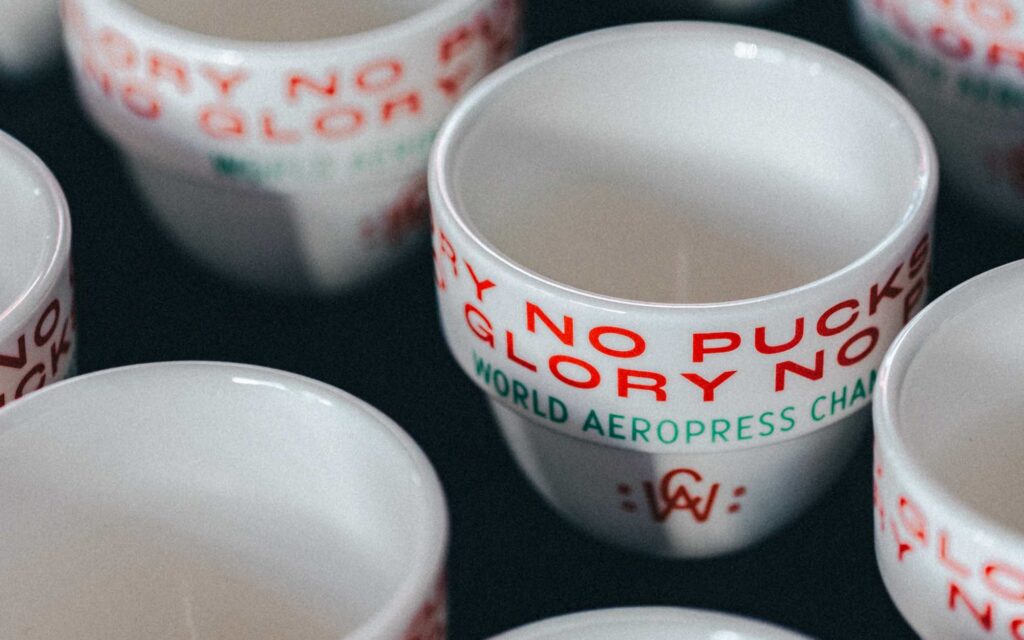
Notable rule changes
For the most part, the format of the World AeroPress Championship has largely remained the same.
One of the most significant rules changes, however, happened in 2021. That year, organisers decreased the dose competitors could use – reduced down from a theoretically unlimited amount of coffee to 18g.
“I think that was a big shock to a lot of people,” Wendelien says.
Essentially, limiting the dose means there is less reason to use the popular bypass brewing method, which Wendelien took advantage of in her winning 2019 routine. She recalls that she was introduced to bypass brewing shortly before taking part in competition. This technique involves using a higher dose and less brewing water to extract concentrated coffee, which is then diluted with water to taste. It’s somewhat similar to Alan Adler’s original AeroPress recipe.
“I think bypass brewing paid off because if you use a really high dose, you can do different things to emphasise the acidity,” Wendelien explains – adding that it can even increase the chances of winning.
“Having judged six or seven championships since my win, I know how difficult it is to stand out,” she says. “You’re tasting the same coffee, and sometimes everyone even uses the same water, so the differences are often really small.”
Partly thanks to its use at the World AeroPress Championship, bypass brewing has gained a lot of traction in the wider coffee industry. Wendelien, however, believes reducing the dose was a necessary rule change.
“If you have a similar recipe that wins four times in a row, people will inevitably start to copy and paste,” she tells me. “With the new rule, it kind of re-sparked creativity again by setting some limits.”
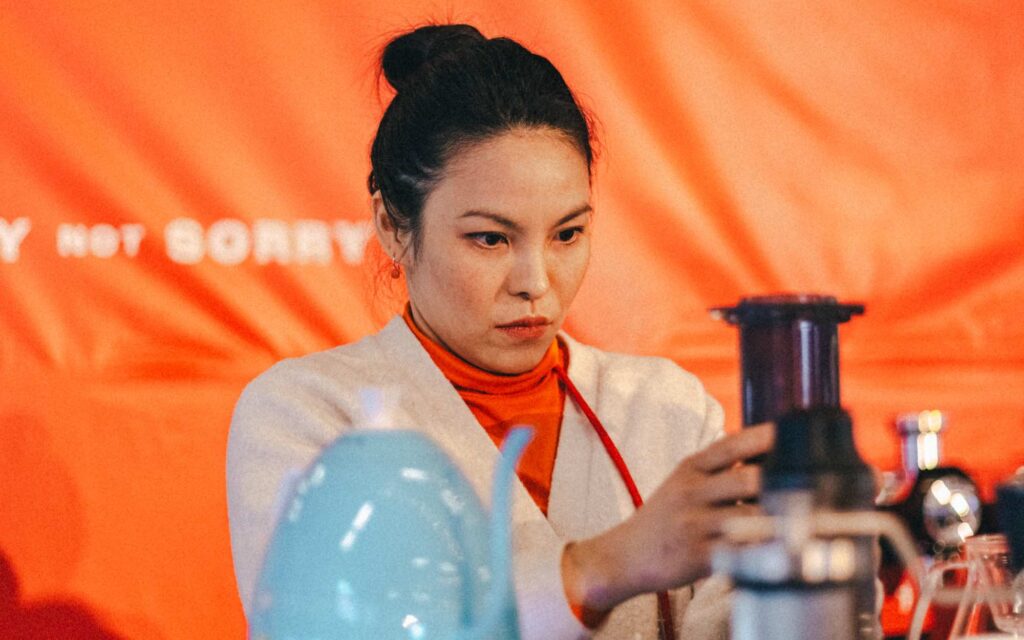
What might be in store for the future?
Looking back on the impact of the World AeroPress Championship, Tim believes it has “definitely inspired a lot of other competitions”.
It’s also clear that aspects of the WAC have influenced wider specialty coffee culture. One example is the inverted brewing method, which became popular among coffee shops and home brewers after being used for the 2009 winning recipe.
“We didn’t really anticipate this degree of responsibility,” Tim says. “Winning actually means a lot. I think six or seven years ago, we didn’t acknowledge the gravitas of the competition. It was just a bit of fun, and if you did well at the competition then great. And if you didn’t, well, it was too bad.
“One day, somebody pulled me aside and said, ‘Well that’s true for you because you have a career in coffee, but for the entry-level barista, putting AeroPress Champion on their CV becomes a gateway for them’,” he adds.
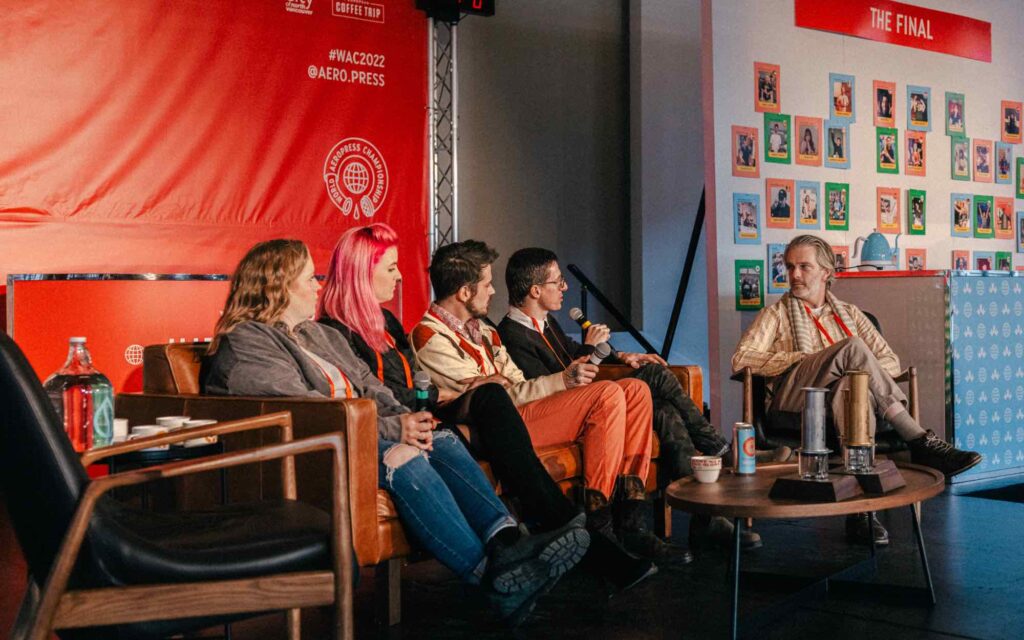
New products, new formats?
With new AeroPress products recently released – including the XL brewer and Flow Control cap – it’s important to question how these could influence the future of the competition. For now, WAC competitors cannot use these new accessories and brewers, but that could always change in the future.
“Without giving too much away, this year’s national Australian Championship will explore some of these opportunities,” Tim hints. While we still know very little about the new multi-round points-based format, it could have a big impact on the World AeroPress Championship going forward.
Competitors can, however, use the new AeroPress Clear. This could help them more easily observe how ground coffee interacts with the brewing water, and potentially exert more control over brewing variables. As a result, they may be able to brew better coffee and increase their chances of winning – as long as their recipe is dialled in right.
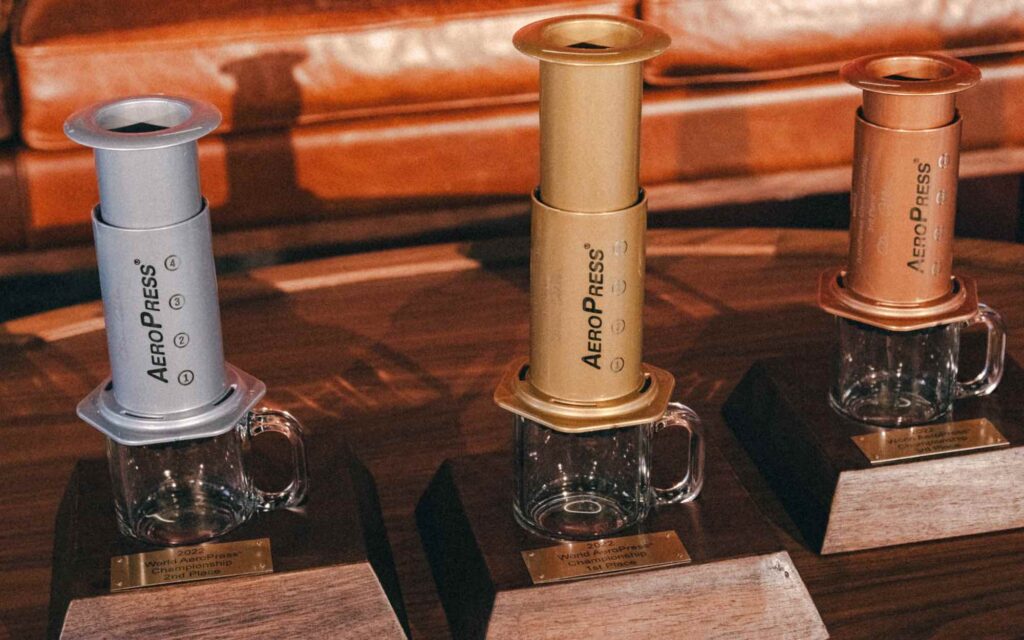
It seems that the WAC will continue to remain one of the more fun, creative, and inclusive competitions in the specialty coffee sector. In turn, it’s cemented its spot as one of the most exciting events taking place every year.
But as for what else the future holds, we will have to wait and see what happens in Australia this December.
Enjoyed this? Then read our article on if there is space for new coffee competitions.
Photo credits: Mavick Media, Shane Gallagher
Perfect Daily Grind
Want to read more articles like this? Sign up for our newsletter!
The post What’s next for the World AeroPress Championship? appeared first on Perfect Daily Grind.
By: Matt HawTitle: What’s next for the World AeroPress Championship?
Sourced From: perfectdailygrind.com/2023/11/whats-next-aeropress-world-championship/
Published Date: Wed, 01 Nov 2023 07:31:00 +0000


